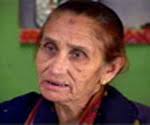
Shahjehan Aapa
1946-2013
Shahjehan Aapa grew up near Delhi in extreme poverty. In the late 1970s, her young daughter was burned alive because of dowry harassment, a tragedy that moved her to social activism. She helped found Shakti Shalini in 1987, an NGO that addresses gender-based violence by working both with individuals and with the broader community. The GFP staff note with sadness Shahjehan's death in September of 2013 after an accident on her way to Mahela Panchayat.
Keywords: feminist conferences, gender-based violence, community activism
Media: Transcript (English), Video, Bibliography, YouTube Video, Name Pronunciation Audio
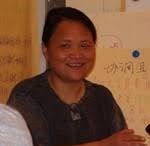
Ai Xiaoming
Ai Xiaoming, born in 1953, is a feminist literary scholar and the co-producer and director of the Chinese version of The Vagina Monologues, one of the activities of the Stop Domestic Violence network. She is Deputy Director of the Women's Studies Center and director of the Sex/Gender Education Forum in Zhongshan University, Guangzhou.
A chapter in Gender Dynamics, Feminist Activism and Social Transformation in China published by Ke Qianting in 2019 discussing the Vagina Monologues in China can be found here.
Keywords: feminist conferences, media, academia and women's studies, education, gender-based violence, politics and the law, reform of domestic/family roles
Media: Transcript (English, Mandarin), Video (English, Mandarin), Bibliography, YouTube Video (Mandarin, English Dubbed), Name Pronunciation Audio
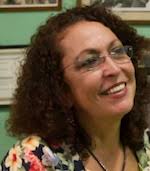
Mónica Baltodano
Mónica Baltodano, born in 1954, began her activism with the Sandinistas as a student and continued her efforts through underground mobilization, surviving imprisonment and torture. She was awarded the title of Commander Guerrilla for her service, and has held a number of political offices including Vice Minister of the Presidency and Minister of Regional Affairs. Upon leaving the FSLN in 2005, Ms. Baltodano helped to found the Movement to Reclaim Sandinismo (known as El Rescate).
Keywords: education, gender-based violence, imprisonment, politics and the law
Media: Transcripts (English, Spanish), Video (English, Spanish), Bibliography, English YouTube Video, Name Pronunciation Audio

Bertha Inés Cabrales
Bertha Inés Cabrales was born in 1943 and joined the Sandinista Front during college and in the late 1970s was sent to Sweden to organize Solidarity events in Europe. She was active in the Luisa Amanda Espinoza Association of Nicaraguan Women and at last contact was head of the Collectivo de Mujeres Itza, an organization that provides sexual and reproductive health counseling as well as legal assistance for victims of gender-based violence.
Keywords: gender and health, media, gender-based violence, reproductive rights, rural women and land reform
Media: Transcript (English, Spanish), Video (English, Spanish), Bibliography, YouTube Video (English, Spanish) Name Pronunciation Audio
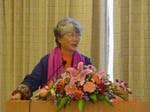
Chen Mingxia
Chen Mingxia, born in 1948, is a researcher at the Institute for Legal Research of the China Academy of Social Sciences, and was one of the leaders who initiated an anti-domestic violence project that developed into the first large scale women's NGO in China, Stop Domestic Violence. She headed this first national women's network.
Keywords: feminist conferences, education, gender-based violence, reform of domestic/family roles
Media: Transcript (English, Mandarin), Video (English, Mandarin), Bibliography, YouTube Video (Mandarin, English Dubbed), Name Pronunciation Audio
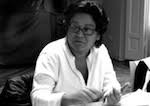
Violeta Delgado
Violeta Delgado was born in 1969, participating in the National Literacy Campaign when she was just 11 years old, kicking off a lifetime of political participation and activism. She became involved in a campaign to end domestic violence. She has done consulting, run for the National Assembly, and now works with CINCO - an organization that researches the media's role in society and politics. In 2005, Delgado was part of the group of 1000 Peacewomen that was nominated for the Nobel Peace Prize.
Keywords: feminist conferences, gender and health, education, gender-based violence, politics and the law
Media: Transcript (English, Spanish), Video (English, Spanish), Bibliography, YouTube Video (English, Spanish) Name Pronunciation Audio
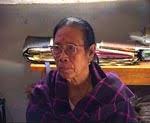
Ima Thokchom Ramani Devi
Ima Thokchom Ramani Devi was born in 1930. At last contact, she was serving as the General Secretary of All Manipur Women's Reformation and Development Samaj.The Samaj has taken up several issues like banning of alcohol, rape, individual cases of women, and the Armed Forces Special Powers Act. She belongs to the Meitei community.
Keywords: gender-based violence, reform of domestic/family roles
Media: Transcript (English), Video, Bibliography, YouTube Video, Name Pronunciation Audio

Josephine Effah-Chukwuma
Josephine Effah-Chukwuma, born in Lagos in 1966, is a specialist in gender and development and a human rights advocate. She received her B.A. in English, and her M.A. in development studies with a special focus on women’s issues, from the Institute of Social Studies in the Hague, the Netherlands. She worked for a few years for the Constitutional Rights Project (CRP), and then in 1999 established Project Alert on Violence Against Women, a not-for-profit that addresses gender-informed abuses The Project provides counseling, advocacy, and temporary shelter for abused persons. The organization opened the first shelter for abused/assaulted women and girls in Nigeria in 2001.
Keywords: community activism, gender-based violence, reform of domestic/family roles, environment, feminist conferences
Media: Name Pronunciation Audio, Transcript, Video, YouTube Video
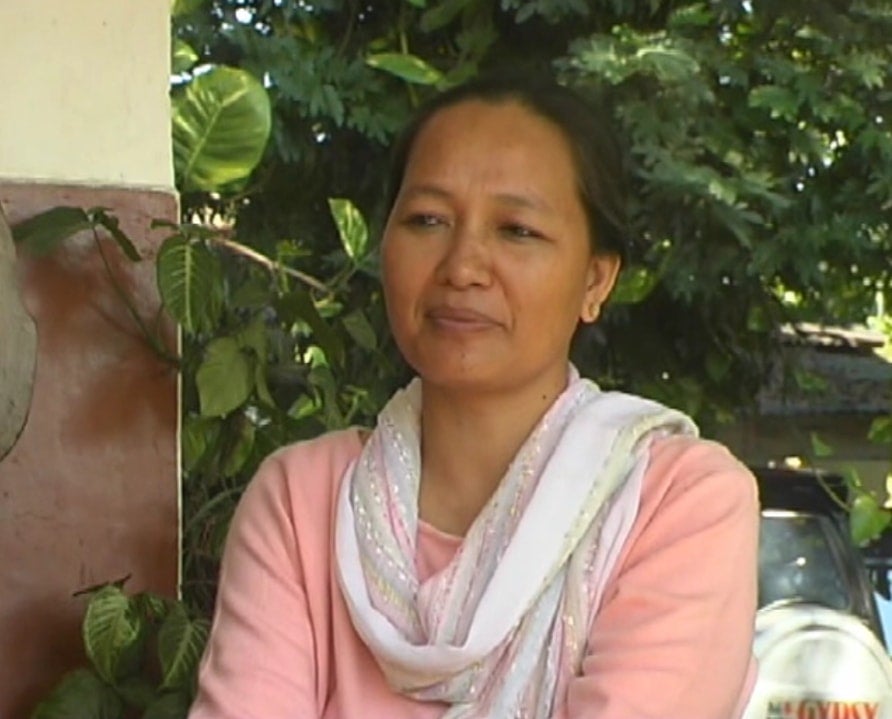
Jarjum Ete
Jarjum Ete, born in 1963, belongs to the Galo tribe and is the Chairperson of the Arunachal Pradesh State Commission on Women which discusses women's participation in panchayats, customary laws, need for a state women's commission and anti-liquor laws. She has very strong views on legalisation of prostitution.
Keywords: gender and health, community activism, gender-based violence, sex work, intersectionality, politics and the law
Media: Transcript (English), Video, Bibliography, YouTube Video, Name Pronunciation Audio
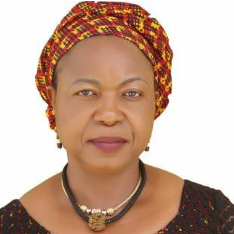
Dr. Joy Ngozi Ezeilo
Dr. Joy Ngozi Ezeilo is professor of law and the Dean of the Law School, University of Nigerian (UNN). She has been the lead professor of the "Women, Children, and the Law" class at the UNN since 1997. An activist and feminist scholar, Dr. Ezeilo was appointed the UN Special Rapporteur on trafficking in persons between 2008 and 2014, during which time she traveled to several countries to determine the causes, mechanisms, and scope of human trafficking. She is an active member of the civil society movement in Nigeria, where she founded the Women’s Aid Collective (WACOL), a not-for-profit that works to promote and protect the rights of women and girls. She is the founder and moderator of the West African Women’s Rights Coalition (WAWORC).
Keywords: politics and the law, reform of domestic/family roles, gender-based violence, academia and women's studies, environment, feminist conferences
Media: Name Pronunciation Audio, Transcript, Video, YouTube Video
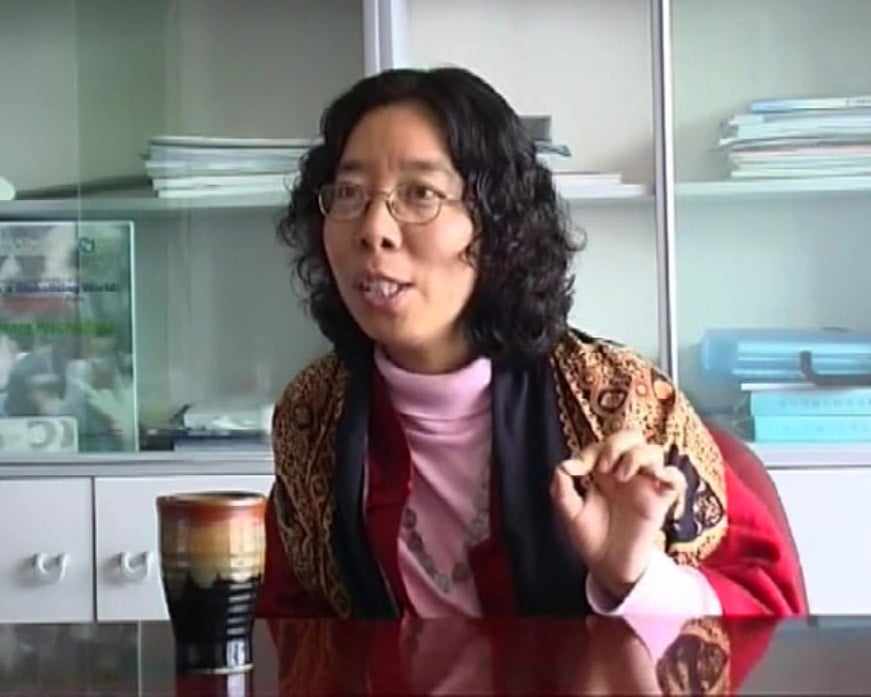
Ge Youli
Ge Youli, born in 1962, is the China Country Director for the Global Alliance for Workers and Communities in Guangzhou. She has worked at the Ford Foundation and at the United Nations Development Program in Beijing, becoming involved in many feminist projects in China.
Keywords: feminist conferences, gender-based violence, politics and the law, reform of domestic/family roles
Media: Transcript (English, Mandarin), Video (English, Mandarin), Bibliography, YouTube Video (Mandarin, English Dubbed), Name Pronunciation Audio

Xueqin (Sophia) Huang
Xueqin (Sophia) Huang was born in 1988 in Shaoguang, Gangdong province. She graduated from Jinan University. She used to work as a journalist for a national news agency and progressive newspaper. She is freelancing now, writing for Southern Metropolis Weekly, The Livings, The Initium Media and NGOCN. Her reporting focuses on democracy development, civil society and the rights of disadvantaged groups in China. She published a report on workplace sexual harassment of Chinese female journalists in 2017, which ignited and promoted #Metoo movement in China. She is dedicated to women's rights and advocacy for anti-sexual harassment law. In 2019 she was jailed for several months for her reporting on Hong Kong's pro-democracy movement. Read more about Xueqin (Sophia) Huang and her activism in the face of political repression here.
Keywords: gender-based violence, media, politics and the law, community activism
Media: Transcript (English, Mandarin)
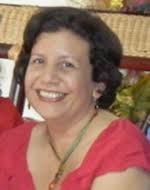
Juanita Jiménez
Juanita Jiménez was born in 1967. She is a lawyer, a leader in the Women's Autonomous Movement, and a longtime activist focusing primarily on women's health and reproductive rights. In recent years, she has become particularly active in protesting the 2006 law that outlawed all forms of abortion in Nicaragua. She has faced political persecution for her work in favor of abortion, and in particular for her support of a 9-year-old girl who had an abortion after being sexually abused.
Keywords: gender-based violence, politics and the law, reproductive rights
Media: Transcript (English, Spanish), Video (English, Spanish), Bibliography, YouTube Video (English, Spanish), Name Pronunciation Audio
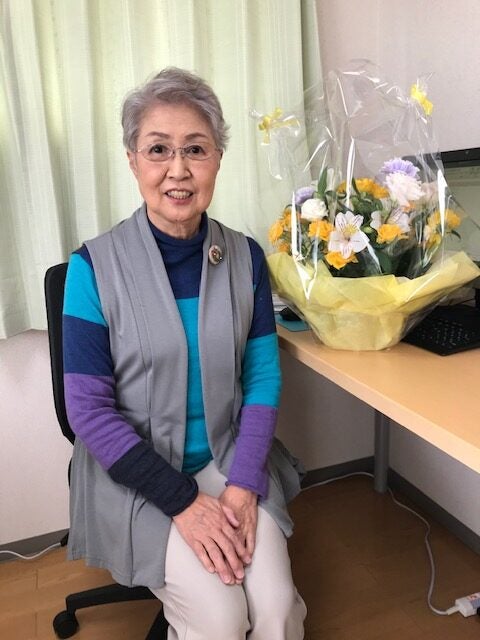
Teruko Karikome
Teruko Karikome, founder and former Executive Director (2007~2019) of NPO Women’s Space Fukushima (https://www.npo-womensspacefukushima.com/, formerly, Association Supporting Women’s Independence), Koriyama City, Fukushima Prefecture. She has long and extensive experience promoting women’s rights and wellbeing including previously serving as the Director of the Koriyama City’s Maternal and Child Welfare Center. Following the Great East Japan Disaster in 2011, her NPO managed “Women’s Space” in the biggest evacuation shelter in Fukushima, and continues to operate programs such as telephone counseling, support groups, and workshops on gender-based violence, while advocating for policy attention to women in Fukushima. Although she stepped down from the Executive Director, she continues to be actively involved in the growing program activities of Women’s Space Fukushima.
Keywords: environment, gender-based violence, reform of domestic/family roles, community activism
Media: Transcript (English, Japanese), YouTube Video (Japanese, English Subtitles)

Lata Pratibha Madhukar
Lata Pratibha Madhukar, born in 1955, has worked as an anchorperson for the radio in Maharashtra, a research assistant in the Research Centre for Women's Studies, and later an activist at the Women's Centre. She joined Narmada Bachao Andolan for environmental rights and became the national convenor for the National Alliance of People's Movements.
Keywords: academia and women's studies, gender-based violence
Media: Transcript (English), Video, Bibliography, YouTube Video, Name Pronunciation Audio
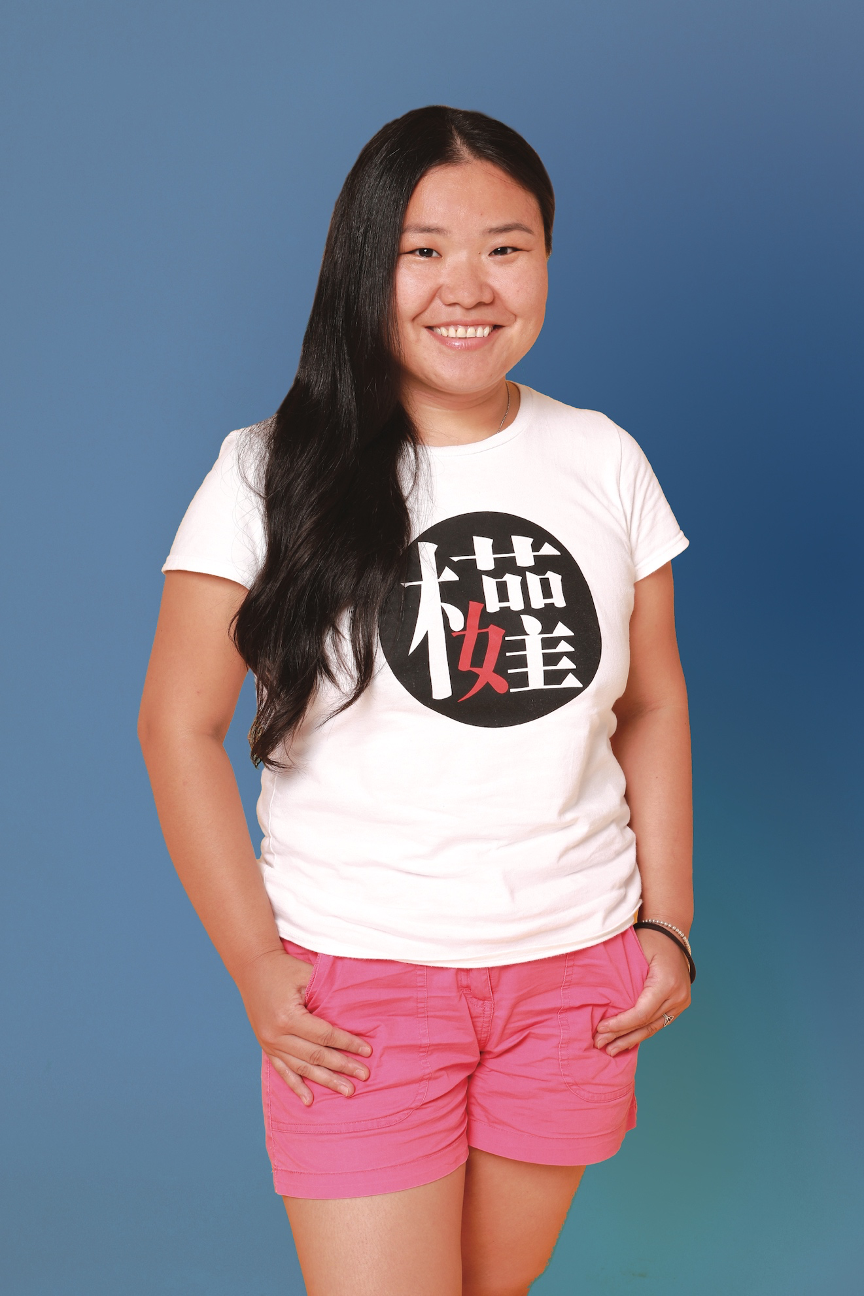
Sanshan (Joy) Lin
In April 1987, Sanshan Lin (Joy Lin) was born in a small village in Yongji County Jilin Province. After graduating with a bachelor degree in sociology in Northeast Normal University, she went to Shanghai and started her career in executive search industry. In November 2016, she founded 我们与平权 Wequality, a feminist organization dedicated to raising public awareness of gender inequality in China, building community, and empowering members to unite to make gender equality a reality. Through regular WeChat articles and online/offline activities, Wequality continues its advocacy. In 2018, Wequality initiated “Our Stories” project to release interview reports annually with people’s experiences and opinions on different gender issues in China. The one on sexual harassment was released in 2019 while another on gender discrimination in 2020.
Keywords: community activism, education, gender-based violence
Media: Transcript (English, Mandarin)
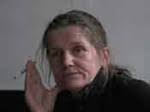
Anna Lipowska-Teutsch
Anna Lipowska-Teutsch was born in 1944 in Warsaw, Poland. She graduated with a Master of Arts in Psychology from the Jagiellonian University in Cracow in 1969. She worked for the Acute Poisoning Clinic in Cracow where she counseled victims of suicide, especially women who had been victimized by family members. In 1990, she co-founded the Society for Crisis Intervention designed to intervene in cases of domestic violence. Since 2002, she has also worked for the rights of Roma (a.k.a. "gypsies") women in Poland.
Keywords: gender-based violence
Media: Transcript (English, Polish), Video (English, Polish), Bibliography, English YouTube Video, Name Pronunciation Audio
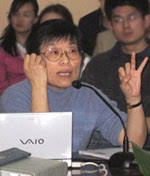
Liu Bohong
Liu Bohong, born in 1951, is Deputy Director of the Institute of Research on Women of the All-China Women's Federation, circulating feminism and promoting gender-awareness in the Chinese government system, notably formulating national programs that implement the 1995 UN Platform for Action.
Keywords: academia and women's studies, education, gender-based violence, politics and the law, reproductive rights, rural women and land reform
Media: Transcript (English, Mandarin), Video (English, Mandarin), Bibliography, YouTube Video (Mandarin, English Dubbed), Name Pronunciation Audio
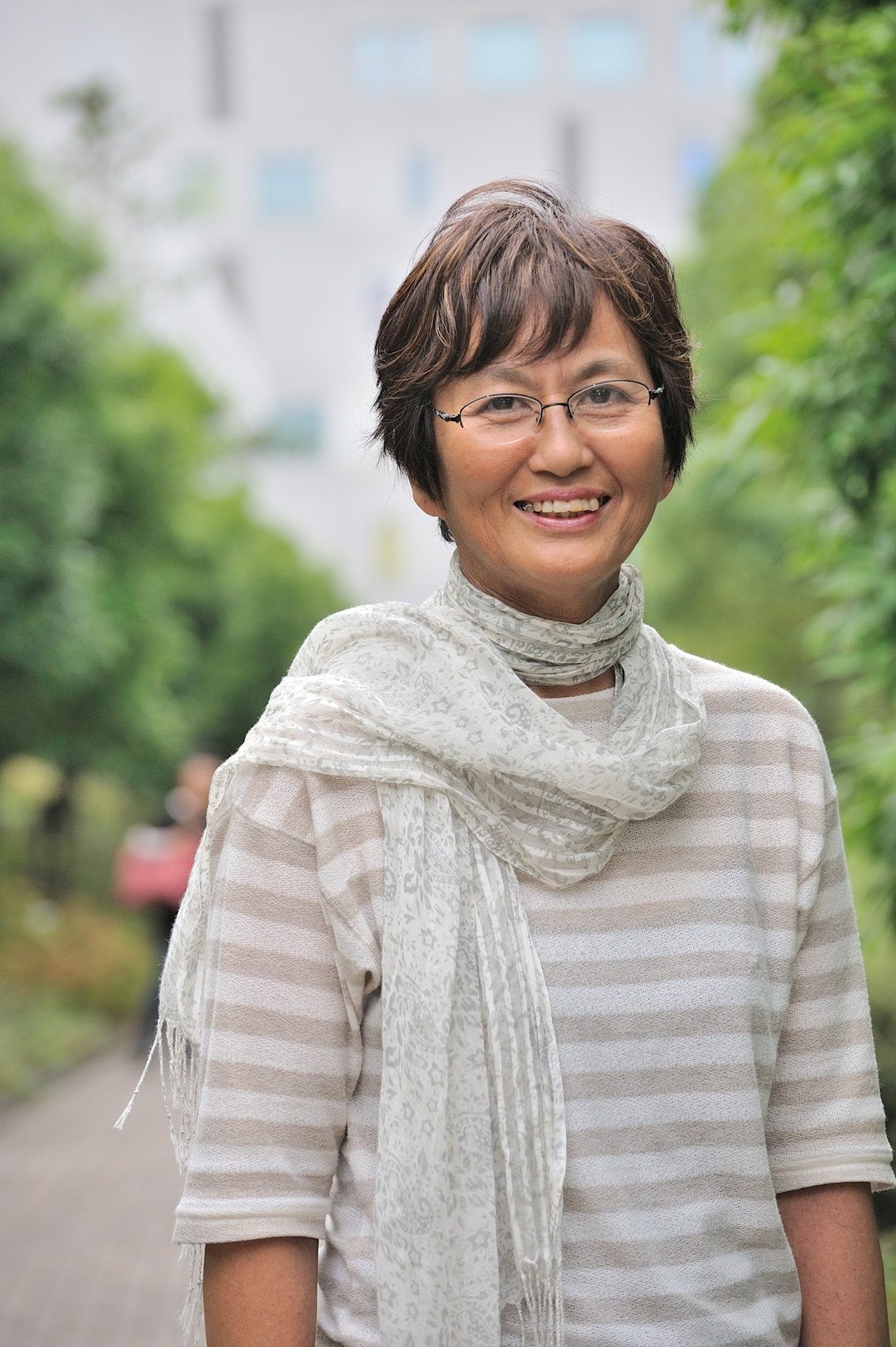
Reiko Masai
Reiko Masai, founder and Executive Director of NPO Women’s Net Kobe, Kobe City, Hyogo Prefecture, the first group in Japan to call attention to disaster-related gender-based violence and published reports documenting women’s experiences, including Women talk about the Great Hanshin-Awaji Earthquake (English translation available at https://wn-kobe.or.jp/bosai/eng/index.html). For over thirty years, Ms. Masai has worked to promote women’s rights and gender equality in Japan. In 2007, she launched Disaster & Gender Information Network, the first initiative of its kind in Japan, and co-founded Women's Network for East Japan Disaster in 2011 (http://risetogetherjp.org/?cat=46), also the first of its kind, advocating for more inclusive disaster response. For her tenacious activism, she has received numerous awards, including Kato Shizue Award in 2003 and the Champion of Change Japan Award from the Fish Family Foundation in 2018.
Keywords: gender-based violence, community activism, gender and health
Media: Transcript (English, Japanese), YouTube Video (Japanese, English Subtitles)

Yamileth Mejía
Yamileth Mejía was born in 1967, joining the national Literacy Campaign as a girl and receiving her teacher training in Cuba in 1984. She is one of the nine feminists formally accused by the Government of Nicaragua for supporting the rights of an eleven year-old girl who had been raped to obtain an abortion. At last contact, she was working for the Project for Comprehensive Services to Victims of Gender-based Violence funded by the Spanish Cooperation Agency.
Keywords: community activism, education, gender-based violence, reproductive rights, reform of domestic/family roles
Media: Transcript (English, Spanish), Video (English, Spanish), Bibliography, YouTube Video (English, Spanish), Name Pronunciation Audio
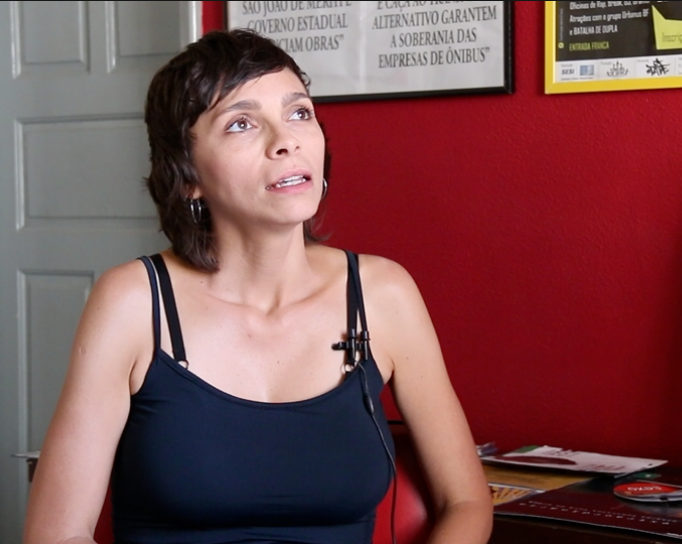
Giordana Moreira
Giordana Moreira, born in 1980, is a human rights activist and has been working in the arts as a cultural producer since the-mid 2000s. In 2011 she created Roque Pense!, a network of women cultural producers that promotes projects and festivals through music and graffiti arts to raise awareness about women’s rights and to celebrate women’s artistic work.
Keywords: gender-based violence, art/writing as activism, community activism
Media: Transcript (English, Portuguese), Video, YouTube Video (Portuguese, English) Name Pronunciation Audio

Vilma Núñez
Vilma Núñez, born in 1938, served as the first woman on Nicaragua's Supreme Court after the Sandinista Revolution. As a student, she became a member of the FSLN and participated in the anti-Somoza struggle, until she was imprisoned for these efforts in 1979. Núñez has been unofficially banished from the FSLN after running for president against Daniel Ortega and defending charges of sexual abuse against him. Núñez founded the Nicaraguan Center for Human Rights (CENIDH) in 1990.
Keywords: gender-based violence, human trafficking/prostitution, imprisonment, international rights, politics and the law
Media: Transcript (English, Spanish), Video , Bibliography, Name Pronunciation Audio
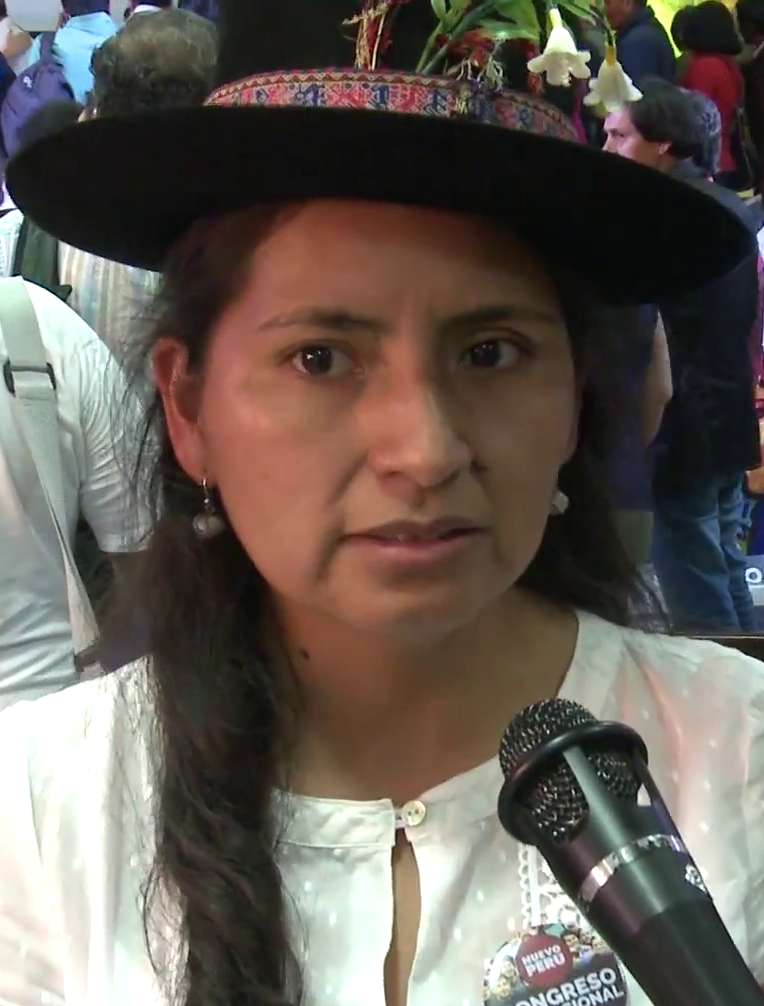
Tania Pariona Tarqui
Tania Pariona Tarqui, born in 1984, is an indigenous activist, Quechua leader, feminist, politician, human rights activist and former Congressperson. As an activist, she works to establish social equality for indigenous youth and women. She began her community work with National Movement of Organized Working Children and Adolescents of Peru (MNNATSOP), an overarching umbrella for many children’s working groups. She was chosen as a Latin American delegate and had her first experience of international representation at age 15 at the “World Summit for Children” at the United Nations in New York. She studied Social Work at the San Cristóbal of Huamanga University, graduating in 2009, and then Human Development at the Pontifical Catholic University of Peru in Lima. She went on to work with the Centre for Indigenous Cultures of Peru (CHRIAPAQ), collaborating on several projects aimed at indigenous youth and women nationally and internationally. In 2010, with Andean and Amazonian sisters, she helped form the Organización Nacional de Mujeres Andinas y Amazónicas de Perú, (ONAMIAP) that promotes the participation of indigenous women and fulfillment of their individual and collective rights. She was the first youth secretary for ONAMIAP. She was elected to the Peruvian Congress in 2016 by the Broad Front for Justice, Life and Freedom, coalition of political parties. In September 2017, she joined the New Peru movement. From 2018-2019, she was the president of the Commission on Women and Family, which promoted the first thematic plenary session focused on a women’s agenda and equality between men and women. Her parliamentary work was dedicated to the defense of the rights of indigenous and native peoples against mining companies, the human right to water and reparations for the victims of the armed conflict, and working against impunity of the perpetrators of crimes, including compulsory sterilization under Alberto Fujimori's government. She is currently assuming responsibility for the Indigenous Women’s Program in CHIRAPAQ and has concerns for the indigenous populations of the Sierra and jungle coast, in the face of the COVID-19 pandemic.
Keywords: community activism, gender-based violence, indigenous issues, reproductive rights, rural women and land reform
Media: Transcript (Spanish, English), Video, YouTube Video (Spanish, English Subtitles), Name Pronunciation Audio
Interviewee Photo Credit
By psperu. https://commons.wikimedia.org/wiki/File:Tania_Pariona_Tarqui.png. Creative Commons. Accessed 2 February, 2021.
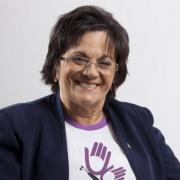
Maria da Penha Maia Fernandes
Maria da Penha Maia Fernandes was born in 1945 in Fortaleza, Ceará. She is a leader in the struggle against domestic violence in Brazil. Victimized by her husband in 1983, she was the first to successfully bring a case of domestic violence to the Inter-American Commission on Human Rights. In 2006, Brazil Federal Law 11340 was ratified, known as the "Maria da Penha Law on Domestic and Family Violence."
Keywords: gender-based violence, politics and the law
Media: Transcript (Portuguese, English), Video, YouTube Video (Portuguese, English Subtitles) Name Pronunciation Audio
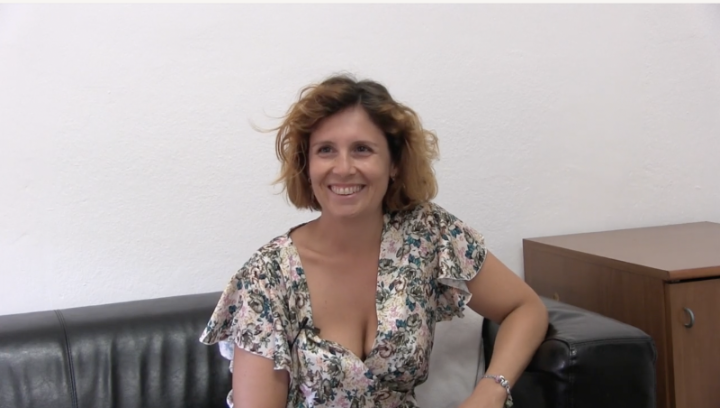
Samanta Picciaiola
Samanta Picciaiola was born in 1976. She received her research doctorate in Italian studies at Sorbonne Paris IV and the University of Florence and a degree in philosophy from University of Bologna. She has worked full time as a public primary school teacher since 2005. She is an activist for the rights of LGBTQ+ people.
Keywords: community activism, education, gender-based violence
Media: Transcript (Italian, English), YouTube Video (Italian, English Subtitles)

Sandra Ramos
Sandra Ramos was born in 1959 and is a leader in the Women's Rights Movement whose activism focuses on women workers in the maquila. She is a co-founder and director of Nicaragua's María Elena Cuadra Women's Movement, which provides scholarships for nontraditional jobs, has a small credit program for unemployed women, teaches women about their labor rights, and provides training for negotiation techniques.
Keywords: gender and health, gender-based violence, politics and the law
Media: Transcript (English, Spanish), Video (English, Spanish), Bibliography, English YouTube Video, Name Pronunciation Audio
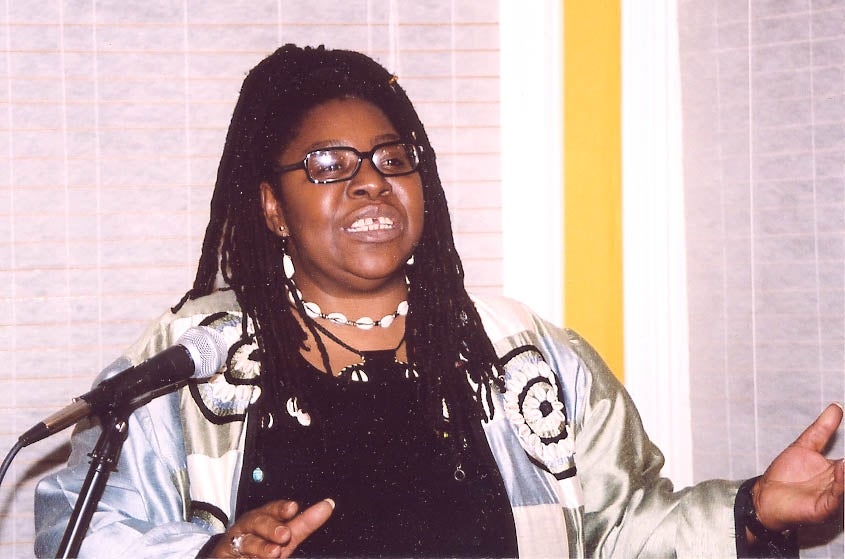
Loretta Ross
Loretta Ross, born in 1953, is an activist and was one of the first African American women to direct a rape crisis center. She has served as director of the Women of Color Programs for the National Organization for Women, as national co-director of the March for Women's Lives in DC, and as National Program Research Director for the Center for Democratic Renewal. She founded the National Center for Human Rights Education and co-authored "Undivided Rights: Women of Color Organizing for Reproductive Justice". She is a founding member and most currently a national coordinator of SisterSong Women of Color Reproductive Health Collective. The New York Times published an article about Loretta Ross on November 19th, 2020, which can be found here. Congratulations to United States GFP interviewee Loretta Ross on being named a 2022 MacArthur Fellow!
Keywords: gender and health, feminist conferences, gender-based violence, intersectionality, reproductive rights
Media: Transcript (English), Video, Bibliography, YouTube Video, Name Pronunciation Audio

Iara Amora dos Santos
Iara Amora dos Santos, born in 1984 in Fortaleza, Ceará, is a project supervisor at the Center for the Working Woman, an NGO in Rio de Janeiro that supports working class women in understanding their rights. Iara received her B.A. in Law from the Federal University of Rio de Janeiro and has a degree in Women and Human Rights from the Law School at the University of Chile.
Keywords: education, politics and the law, reproductive rights, gender-based violence
Media: Transcript (Portuguese, English), Video, YouTube Video (Portuguese, English Subtitles), Name Pronunciation Audio
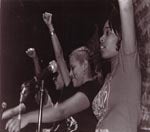
Sista II Sista
Sista II Sista is a Brooklyn-wide, community-based organization located in New York. It is a collective of working class young and adult Black and Latino women building together to model a society based on liberation and love. The organization is dedicated to working with young women of color to develop personal, spiritual and collective power, and is involved in a variety of projects, including The Freedom School for Young Women of Color, The Big Mouth Project, and Sista Liberated Ground.
Keywords: community activism, gender-based violence, intersectionality
Media: Transcript (English), Video, Bibliography, YouTube Video, Name Pronunciation Audio

Maria Amélia de Almeida Teles
Maria Amélia de Almeida Teles, born in 1944, is a founding member of the União de Mulheres de São Paulo (São Paulo Women’s Union), a feminist NGO that focuses on the fight against domestic violence and on women’s empowerment and legal rights. A former member of the Communist Party of Brazil and, in the 1970s, a victim of torture by the military government that ruled Brazil from 1964-1985, Teles frequently lectures on feminism and human rights and has published widely on the history of feminism and women’s human rights in Brazil.
Keywords: gender-based violence, imprisonment, politics and the law, LGBTQ rights, racial identity
Media: Transcript (English, Portuguese), Video, YouTube Video (Portuguese, English Subtitles), Name Pronunciation Audio
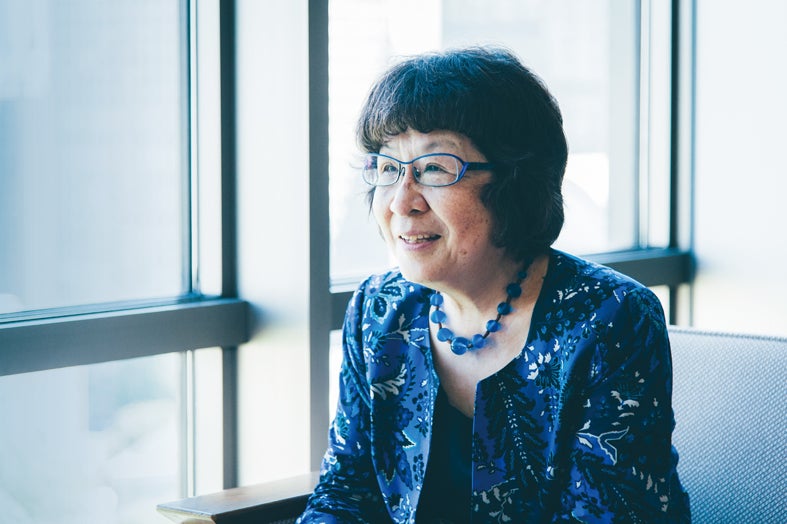
Yukiko Tsunoda
Yukiko Tsunoda, attorney at law; previously a professor at the Law School of Meiji University in Tokyo (2004-2013). Attorney Tsunoda is a pioneer in feminist jurisprudence, especially in the areas of human rights, gender discrimination, and gender-based violence in Japan. In addition to her long career of legal practice representing and defending women in both criminal and civil courts, she has written and lectured extensively, including Sei no hōritsugaku [Sexuality and jurisprudence] (1991) and Seisabetsu to bōryoku [Gender discrimination and violence] (2001) She has been actively involved in various women’s organizations including the Tokyo Rape Crisis Center (legal advisor since 1986), the Domestic Violence Research & Action Group (Co-Founder, 1991), the Center for Education and Support for Women (Director since 2001), and the Lawyers Acting to Eliminate Discrimination Against Women in Entrance Examination for Medical Faculties (Co-Chair, https://fairexam.net/).
Keywords: gender-based violence, politics and the law
Media: Transcript (English, Japanese), YouTube Video (Japanese, English Subtitles)
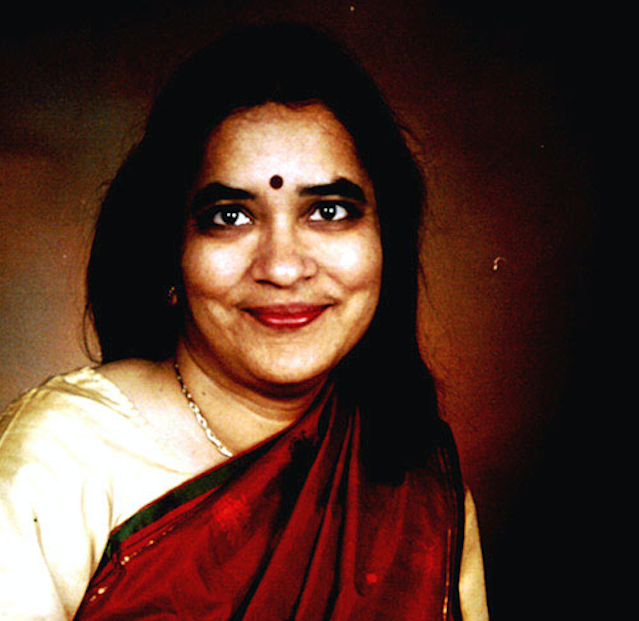
Ruth Vanita
Ruth Vanita, born in 1955, is an author and professor at the University of Montana, where she teaches courses in the Humanities, Literature, and Women's Studies. She was formerly a reader in English at Miranda House and the English department, Delhi University. She is one of the founding co-editors of Manushi, India's first feminist journal.
Keywords: education, gender-based violence, LGBTQ rights, community activism, academia and women's studies
Media: Transcript (English), Video, Bibliography, YouTube Video, Name Pronunciation Audio
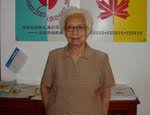
Wang Xingjuan
Wang Xingjuan, born in 1931, was an editor at the Beijing Publishing House and started the first women's domestic violence hot line in China. This became the Maple Women's Counseling Center, one of the earliest women's NGOs in China. At the last contact, she was serving as the director.
Keywords: feminist conferences, gender and health, gender-based violence, politics and the law
Media: Transcript (English, Mandarin), Video (English, Mandarin), Bibliography, YouTube Video (Mandarin, English Dubbed), Name Pronunciation Audio
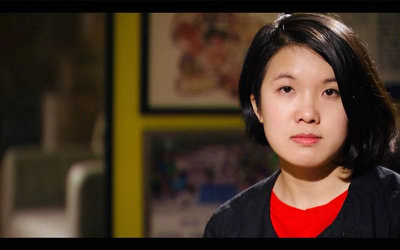
Wei Tingting
Etsuko Yahata
Etsuko Yahata, founder and Executive Director of NPO Hearty Sendai, Sendai City Miyagi Prefecture (https://www.hearty-sendai.com/). She spearheaded grassroots initiatives to assist women affected by the 2011 Great East Japan Disaster, on top of running a domestic violence shelter and many assistance programs. Originally trained as a midwife, she has since worked over 30 years in fighting against gender-based violence and promoting reproductive health and justice, human rights, and nonviolence. In addition to serving as the Director of the Miyagi Regional Center of Yorisoi Hotline (a nation-wide free 24-hour telephone assistance program), she serves on the board of director of Sendai Gender Equal Opportunity Foundation, Child Line Miyagi, and many others.
Keywords: community activism, gender and health, gender-based violence
Media: Transcript (English, Japanese), YouTube Video (Japanese, English Subtitles)
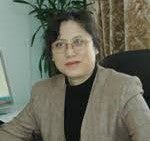
Zhang Li Xi
Zhang Li Xi, born in 1953, is President of the China Women's University, affiliated with the All-China Women's Federation. Under her leadership, the CWU created the first Women's Studies Department in China, and the first Women's Studies major.
Keywords: feminist conferences, academia and women's studies, gender-based violence, intersectionality, politics and the law, rural women and land reform
Media: Transcript (English, Mandarin),Video (English, Mandarin), Bibliography, YouTube Video (Mandarin, English Dubbed), Name Pronunciation Audio



